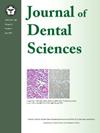评估根尖切除术对自体移植成功率的影响:台湾一项为期六年的回顾性队列研究
IF 3.1
3区 医学
Q1 DENTISTRY, ORAL SURGERY & MEDICINE
引用次数: 0
摘要
背景/目的自体牙移植是修复无牙区一种可行的手术方法。然而,根管干预,特别是根尖切除术,对移植发育完全的牙齿的结果的影响仍然不完全清楚。本研究以台湾人口为研究对象,评估自体牙移植的成功率和存活率,并评估各种牙髓干预措施对治疗结果的影响。该研究包括40名患者,45颗移植牙齿发育完全。三位专家评估放射影像。统计分析确定了根管干预对移植结果的影响。结果患者手术时平均年龄35.1±12.5岁,平均随访时间11.7±9.9个月。最新随访成功率为64.1%,生存率为89.7%。接受根尖切除术或其他根管干预的牙齿与未接受根尖切除术或其他根管干预的牙齿之间的差异无统计学意义(p值>;0.05)。结论尽管成功率不高,可能是由于评估标准的严格,但高存活率证实了在严格的方案下,完全发育的牙齿自体移植是有效的。目前的证据表明,根管干预对治疗结果没有显著影响。本文章由计算机程序翻译,如有差异,请以英文原文为准。
Assessing the impact of apicoectomy on autotransplantation success rates: A six-year retrospective cohort study in Taiwan
Background/purpose
Tooth autotransplantation is a viable surgical approach for rehabilitating edentulous areas. However, the influence of endodontic interventions, particularly apicoectomy, on outcomes of transplanting fully developed teeth remains incompletely understood. This study evaluated success and survival rates of autotransplantation in fully developed teeth and assessed the impact of various endodontic interventions on treatment outcomes in a Taiwanese population over a six-year period.
Materials and methods
A retrospective cohort study examined records of patients who underwent tooth autotransplantation at National Cheng Kung University Hospital, Taiwan, between 2018 and 2023. The study included 40 patients with 45 fully developed transplanted teeth. Three specialists evaluated radiographic images. Statistical analyses determined the influence of endodontic interventions on transplantation outcomes.
Results
The mean patient age at surgery was 35.1 ± 12.5 years and the mean follow-up period was 11.7 ± 9.9 months. Success rate at latest follow-up was 64.1 %, while survival rate reached 89.7 %. No statistically significant difference was observed between teeth that underwent apicoectomy or other endodontic interventions and those that did not (P-value >0.05).
Conclusion
Despite the modest success rate, possibly due to stringent evaluation criteria, the high survival rate confirms that autotransplantation of fully developed teeth is effective when following strict protocols. Current evidence suggests endodontic interventions do not significantly influence treatment outcomes.
求助全文
通过发布文献求助,成功后即可免费获取论文全文。
去求助
来源期刊

Journal of Dental Sciences
医学-牙科与口腔外科
CiteScore
5.10
自引率
14.30%
发文量
348
审稿时长
6 days
期刊介绍:
he Journal of Dental Sciences (JDS), published quarterly, is the official and open access publication of the Association for Dental Sciences of the Republic of China (ADS-ROC). The precedent journal of the JDS is the Chinese Dental Journal (CDJ) which had already been covered by MEDLINE in 1988. As the CDJ continued to prove its importance in the region, the ADS-ROC decided to move to the international community by publishing an English journal. Hence, the birth of the JDS in 2006. The JDS is indexed in the SCI Expanded since 2008. It is also indexed in Scopus, and EMCare, ScienceDirect, SIIC Data Bases.
The topics covered by the JDS include all fields of basic and clinical dentistry. Some manuscripts focusing on the study of certain endemic diseases such as dental caries and periodontal diseases in particular regions of any country as well as oral pre-cancers, oral cancers, and oral submucous fibrosis related to betel nut chewing habit are also considered for publication. Besides, the JDS also publishes articles about the efficacy of a new treatment modality on oral verrucous hyperplasia or early oral squamous cell carcinoma.
 求助内容:
求助内容: 应助结果提醒方式:
应助结果提醒方式:


